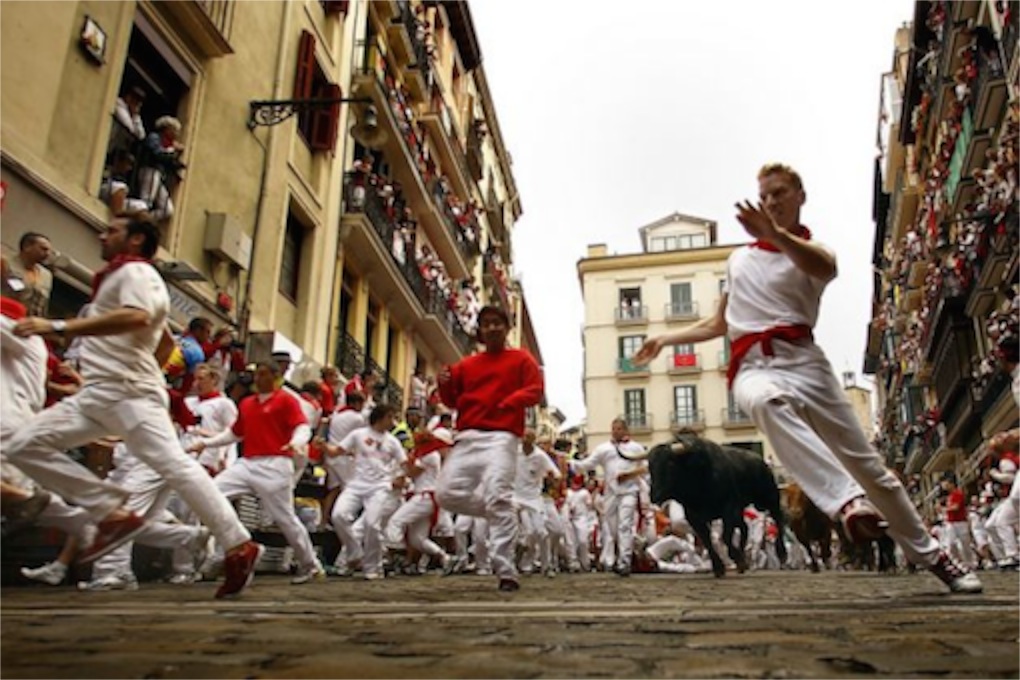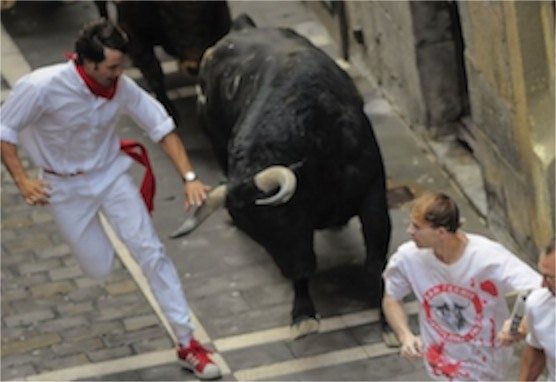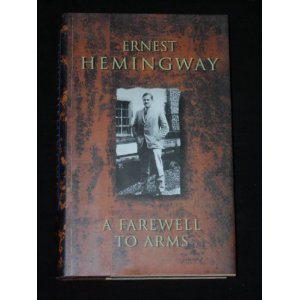Running Bulls and Pushing Bull
11/07/12 05:40

They’re running the bulls at the San Fermin fiestas in Pamplona in northern Spain. Yesterday was the fourth running. Beginning on July 6, each year, the Fiesta San Fermin goes on for nine days of hectic eating, drinking, and bull running. It still happens pretty much the way Ernest Hemingway described the fiesta in The Sun Also Rises. Papa left his mark on the city. There is even a street named Paseo Hemingway. But the big impact of Hemingway is the way that the tourists flock to the city each year. Pamplona is a beautiful small city, more cosmopolitan than in Hemingway’s time, but retaining the historic Navarra and northern Spanish culture. There is a 14th-century Gothic cathedral not far from the Plaza del Toros.
In the book, Hemingway refers to a hotel called La Montoya on one corner of the Plaza del Castillo. In real life, the hotel is the Gran Hotel La Peria. The regular rate for a room is over $600. Rates are higher during the Fiesta, of course.
I imagine that the hotel is not filled with writers and artists this year. With the depressed economy, especially in Europe, it is likely that artists don’t have the extra cash to eat at the outdoor tables at the Café Iruna. They run the bulls around 8 a.m. The actual bullfights are in the evening, starting at 6:30 or so. During the rest of the day, celebrants have plenty of time to indulge their appetites at many restaurants, bars and other hangouts. That’s what Hemingway did. He was a man of robust appetites. When he traveled, he immersed himself in the culture of the place that he visited. He wrote, “If a man is making up a story it will be true in proportion to the amount of knowledge of the life that he has and how conscientious he is.”

This year, however, I imagine there is one real difference. The bars and hotels and restaurants are, I suspect, filled with vulture capitalists. Spanish and Italian bonds have rallied in the wake of the deal that was struck to shore up Spanish banks, but there is wide speculation that the banks will be forced to liquidate some of their toxic assets, primarily real estate repossessed in mortgages gone bad. No one knows for sure what the rules and regulations will be as the details of the deal are still sketchy, but the really big profits will come to the speculators who get in on the deal early. Banks are likely to sell some assets in anticipation of the rules that will be coming. Land is rumored to be selling at an 80% discount, homes at 30% - 40% below where the market is expected to be when recovery takes place. You can bet there are some deals being worked out in the bars and restaurants and the bulls run by on the streets outside. After all it is the venture capitalists who have the money to drop on the expensive venues.
Maybe, if I had the opportunity, I would visit Pamplona in the off-season. Not only would the prices be lower, but the culture might be more authentic to what Hemingway experienced. I’m not that big a fan of bull fighting in the first place. And I certainly don’t run in the same circles as the vulture capitalists.

And I did spring for the restored edition of A Moveable Feast that includes text that was not in the original version. I decided that this was reasonable, since the book was unfinished at the time of Hemingway’s death and perhaps grandson Sean and son Patrick would have some insight as to how the old man might have finished the book.
But I have no desire to read all of his unpublished writings. There is a reason why some things are not published. Literature is the product of writing and editing and re-writing. Publication is a lengthy process with many discarded words along the way. The Old Man and the Sea is a powerful book in part because of what it doesn’t say. It has been refined and cut until all that remains is the essential.
I think Scribners has it all wrong publishing the semi-autobiographical novel A Farewell to Arms including all of Hemingway’s notes and possible variations. The news release claims that there are 47 alternate endings to the novel in the Scribners edition. Granted, it does have a personal introduction by Patrick and another by Sean. But I don’t think I want to see all of the discarded notes. A Farewell to Arms isn’t my favorite of Hemingway’s books in the first place, but at least what I got to read in my copy is the product of the complete process: writing, re-writing, editing, choosing, discarding and refining.

And, who knows, I might be able to make money on that edition if I found the right vulture capitalist planning a trip to Spain to watch the bulls run. I’m told it isn’t too early to book rooms for next year. I think I’ll ask $50.